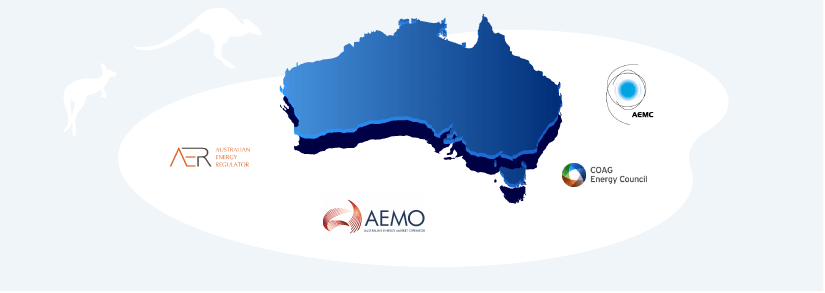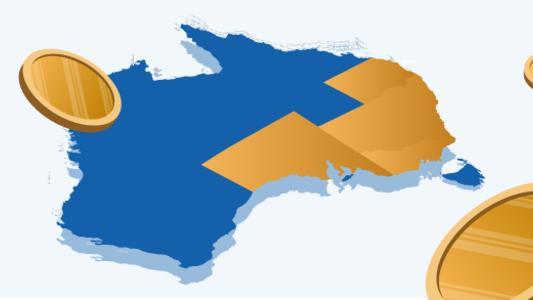The Australian Energy Market: Regulation & Deregulation

The Australian Energy Market is goverened by several different bodies that manage everything from energy generation, to market deregulation. Read on to discover how Australia's energy market works inlcluding energy legislation, governing bodies, and regulations.
Is Australia's Energy Market Deregulated?
Not all of Australia's energy market is deregulated. A large portion of the Australian energy market went through deregulation starting in 1998 when the National Electricity Market (NEM) was established, and 1991 for LPG gas. The NEM is a deregulated portion of the energy market and only encompasses New South Wales, Queensland, Victoria, Southern Australia & Tasmania.
What is Market deregulation?Market deregulation means that customers are able to choose their energy companies and energy companies are allowed to compete on price and offerings within the energy market.
The energy market in Western Australia and the Northern Territory have not yet gone through market deregulation.
Despite deregulation in the energy market, there are still governing bodies in Australia that manage and oversee the energy market to ensure it runs fairly and smoothly.
Who Governs the Australian Energy Market?
There are many governing bodies that make up the Australian energy market, each with clear functions in order to legislate, regulate, and operate all facets of the gas and electricity market in Australia.
The governing bodies for the Australian Energy Market are:
- COAG Energy Council = They encourage development & policy reforms
- Australian Energy Market Commission (AEMC) = They make the rules
- Australian Energy Regulator (AER) = They enforce the rules
- Australian Energy Market Operator (AEMO) = They operate & develop the power systems
Below we cover these organisations in more details
COAG Energy Council
The Council of Australian Governments (COAG) is the intergovernmental forum in Australia, which governs matters of national importance.
The COAG Energy Council works together to promote a national energy agenda throughout Australia and aims to promote the interests of energy consumers in Australia while ensuring greater productivity, efficiency, affordability and sustainability of the energy market.
In addition, they aim to encourage stakeholder participation in energy policy, while working towards a more efficient and consistent governance process.
The COAG Energy Council is guided by its 2015 terms of reference, which include:
- The comprehensive responsibility and leadership of the Australian energy market
- The promotion of efficiency and productivity through the development of new technologies
- Ensuring the security of energy within Australia, including developing national emergency response policy, assessing long term market volatility, and promoting an energy market that is resilient to outside factors
- The cooperation between national, state, and territory governments in order to improve the overall energy market through training, research, education, and community engagement
- Encourage the development of Australia’s resources for a more sustainable future
Australian Energy Market Commission (AEMC)
The Australian Energy Market Commission (AEMC) are the rule-makers within Australia’s energy market.
They set out to create the official National Electricity, Gas, and Energy Retail Rules.
The AEMC has two key functions:
- To create rules which protect the consumer while finding a balance between security, reliability, and cost
- To advise and guide Ministers on how to develop the future of the energy markets
Australian Energy Regulator (AER)
The Australian Energy Regulator (AER) enforces the laws and rules created by the AEMC in all jurisdictions except Western Australia, as well as set the Default Market Offer (DMO).
The AER also regulates the energy distributors on the wholesale energy market, energy networks, and retail energy market. Within the wholesale energy market, the AER enforces the national energy legislation and rules while investigating and monitoring compliance.
The AER regulates the energy networks by setting caps on the amount of money of revenue able to be earned. Networks submit their required revenue proposals and the AER decides whether to accept or deny the proposal.
In the retail market, the AER aims to:
- Ensure competition within the market when possible and regulate where competition is not possible
- Provide consumers with the tools necessary to make educated energy market decisions and participate in the market in an effective way, while protecting those unable to ensure their own interests are being met (for example, regulating the introduction of smart meters across Australia)
- Think not only of the impact the energy market has on consumers today but in the long-term future as well.
Australian Energy Market Operator (AEMO)
The Australian Energy Market Operator (AEMO) is the governmental body responsible for the operation, development, and planning of the energy market across Australia including the National Electricity Market, and Wholesale Electricity Market in Western Australia.
The AEMO works to maintain and improve gas and electricity security, manage gas and electricity markets, and facilitate competition and data availability while leading the design for the future of Australia’s energy markets.
AEMO is made up of the following entities:
- National Electricity Market Management Company (NEMMCO)
- Victorian Energy Networks Corporation (VENCorp)
- Electricity Supply Industry Planning Council (ESIPC)
- Retail Energy Market Company (REMCO)
- Gas Market Company (GMC)
- Gas Retail Market Operator
Need Energy Advice ?
Selectra's Energy Experts are Available to Help You Free of Charge
(Free Selectra Service - Currently open)
AEMC & Energy Legislation in Australia
Energy legislation in Australia is under the jurisdiction of the Australian Energy Market Commission (AEMC), which was first created in 2005.
The AEMC derives its power from the National Electricity, Gas, and Energy Retail Laws, which in turn allow it to create the regulatory rules of Australia’s electricity and gas markets.
The AEMC creates Australia’s rules and regulations for the energy market, with respect to the following objectives set out in the legislative laws:
- National Electricity Objective
- National Gas Objective
- National Energy Retail Objective
Below, we break these down in more detail.
National Electricity Objective:
To promote efficient investment in, and efficient operation and use of, electricity services for the long term interests of consumers of electricity with respect to:
- the reference price, quality, safety and reliability and security of supply of electricity
- the reliability, safety and security of the national electricity system
National Gas Objective:
To promote efficient investment in, and efficient operation and use of, natural gas services for the long term interests of consumers of natural gas with respect to price, quality, safety, reliability and security of supply of natural gas
National Energy Retail Objective:
To promote efficient investment in, and efficient operation and use of, energy services for the long term interests of consumers of energy with respect to price, quality, safety, reliability and security of supply of energy.
Need Energy Advice ?
Selectra's Energy Experts are Available To Help You Free of Charge
(Free Selectra Service - Currently open)
Western Australia Energy Regulation
Ultimately, the Australian energy market regulation is based on location. For example, outside of the NEM, Western Australia and the Northern Territory each have their own energy systems, which have their own regulating bodies and authority.
Western Australia regulates its own energy, with some overlap from the NEM regulating bodies. Electricity in Australia is not on the National Electricity Market, instead, they have their own Wholesale Electricity Market (WEM).
The Wholesale Electricity Market is designed to:
- Promote the efficiency, safety, and reliability of electricity production
- Encourage market competition through the facilitation of efficient entry for new competitors
- Prevent discrimination against energy or technological options, such as renewable resources
- Minimize long-term costs for consumers
- Educate consumers on how to manage electricity usage
The WEM is regulated by a number of entities:
- The AEMO operates the WEM, in accordance with the WEM rules and procedures which were first established by the Minister for Energy.
- The Economic Regulation Authority (ERA) regulates, monitors, and enforces compliance with the rules.
- The Rule Change Panel is an independent organization that looks over the administration and decision-making functions in regards to changes in the WEM rules, and the Electricity Review Board is an adjudicator for appeals.
Other energy regulators in Australia
Outside of the government, independent agencies exist to help regulate energy in the consumer’s interest and ensure energy customers are treated fairly and ethically.
Energy Consumers Australia
Energy Consumers Australia (ECA) is an independent agency that works to provide households and small businesses with a voice when it comes to the energy market. Energy Consumers Australia promotes the long-term interest of small energy customers with respect to the price, quality, safety, security, and reliability of energy services through research and analysis in order to identify issues and work with other organizations, governing bodies, regulators, and ombudsmen to help energy consumers.
Distributed Energy Resources Register
While the Distributed Energy Resources Register is not necessarily a regulator or governing body, this register does track and monitor all of the small scale energy generation projects at people's homes across Australia. This means all home solar panels or other renewable energy sources that generate energy being sent back to the power grid are registered within this register.
State and territory Energy Ombudsman
Ombudsmen are officials, representing the public's interest, who investigate and resolve complaints or disputes against an organization, company, or administration.
In Australia, each state or territory has its own Energy and Water Ombudsman services. Energy and Water Ombudsman in Australia are considered industry Ombudsman, and usually have a regulating board or council with both consumer and industry representation who appoint the Ombudsman.
More about Market

What is LPG? Gas Bottle Sizes, Prices & Uses

Energy Ombudsman NSW - Contact EWON

The Energy Ombudsman Victoria (EWOV)

Explained: How Smart Meters Work - Is a Smart Meter Worth It?

The Electricity Reference Price & Default Market Offer 2024

Filing a Complaint with the Energy Ombudsman QLD (EWOQ)

Energy and Water Ombudsman in Australia

Energy Ombudsman SA (EWOSA) and Dispute Resolution

Energy Ombudsman Tasmania Dispute Resolution

Energy Ombudsman WA (EWOWA)

Energy Ombudsman ACT (ACAT)

High Wholesale Electricity Prices Explained - 2023
Click below to find a better deal for your home!

